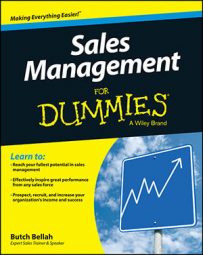As a sales manager, you have your sales process and your sales cycle — you know how it should work and how long it should take to complete. The next step is putting together a formal training program for your team.
You train your sales team on your sales process. Some members of your team want to tell you how they used to do it elsewhere or to share any number of techniques, and that's fine. But, this is your rodeo and you pick the riders.
No matter what the end result of your own sales process was, planning and prospecting must not only be included, they're the genesis of the entire undertaking. As you train your salespeople, you cannot stress enough the importance of these two tasks or habits. If they make them habits, they will certainly be much farther ahead of the competition. Planning and prospecting are essential to sales success at any level.
How to emphasize the value of a sales plan
Ask your salespeople if they would go to the grocery store without a list and just fumble their way down the aisles trying to remember whether they need this or that? That's basically what planning means— make your list of what you need to do, where you need to go and make sure you're doing it in the most effective manner.
Even though it can take on a multitude of definitions, planning is simply researching the market. Successful planning involves market research and putting together a list of contacts to call on the next day or within the next week.
Planning also involves preparing materials and presentations you need, gathering samples, and mapping out your route, your day, and your week. A few minutes of planning can save a salesperson hours and make him so much more productive.
The downside of not planning is simply jumping in the car on Monday morning and heading out to make calls. This can create an inordinate amount of windshield time that is totally wasted. If you simply train your team to plan in advance and work in a very structured, efficient manner, you're ahead of three-quarters of your competition from day one.
By the same token, in a retail establishment the lack of planning could leave a salesperson just hoping someone walks through the door rather than having an appointment scheduled to come see the latest fashions or newest arrivals.
Be prepared for some (even seasoned) salespeople to complain about planning time. It may be hard to start, but if they simply make a habit of it, it becomes easier and more natural, and they see the benefits very quickly.
How to encourage your sales team to promote new prospects
In your role as a trainer, if there is one area to focus on and be your best at, make it in teaching and training your team to prospect, or find potential customers.
If you were to ask them what they all wanted to be better at or improve their skills in, they'd probably answer with "asking for the sale" or "overcoming objections." But if they aren't prospecting, they don't have anyone to ask for the sale and no objections to overcome!
Always be prospecting. That's a good lesson to teach your salespeople and one that will pay far more dividends because no prospects equals no closes. Period.
In almost any sales team the top salesperson isn't the best closer, it's the person who has refined and mastered the art of prospecting. Note this doesn't say the person who prospected the most, but the one who prospects the best.
This is where the planning comes in. If you can get your salespeople to develop a plan and stick with it, success will come.
Prospecting should be something each of your salespeople does regularly in order to keep their skills sharp and to have plenty of potential customers to start into the sales process.
If one of your salespeople is having trouble meeting numbers this month, it may be because he wasn't prospecting two or three months ago. Don't over-analyze his presentation or other sales skills until you see how many real prospects he's working.
Here are the four basic principles of prospecting:
Have a plan: it is suggested having a set time each day or each week to do nothing but prospect. Remove anything else that's a distraction and simply find potential new customers whether by phone or in person. Don't try to multi-task — give it your full attention.
Be prepared: When it's time for someone to start prospecting, start prospecting. Don't waste time looking at maps or trying to find out where you're going or who you're going to call. This time is much too valuable to waste. If you're plan to spend an hour every morning prospecting, you're cheating yourself if you only get in 59 minutes.
Have a goal: Know what you want to accomplish before you ever start. Are you looking for appointments? Seeking email addresses to send out information? Whatever it is, have a clearly defined goal before you ever start the process.
Enjoy yourself: Have fun! Smile. Meet and greet people. Introduce yourself and let them know who you are and how they can reach you. Don't get too stressed over whether these are cold calls, warm calls, or whatever — just make the calls.
Prospecting is an area where your sales manager hat is going to be much needed. Salespeople tend to stop prospecting as soon as they get a few deals working. Don't let them.
If your salespeople aren't prospecting today, they'll have nobody to talk to tomorrow. Whether you require some sort of form, report, or just rely on the numbers to tell the story, make sure your team is constantly meeting and talking to potential new customers.

